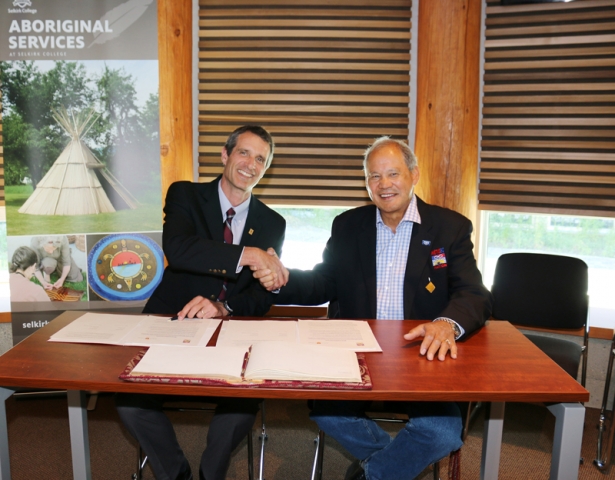Selkirk College and Metis Nation British Columbia Strengthen Bond
The signing of a new protocol with Metis Nation British Columbia will enable Selkirk College to build on its dedication to better supporting Aboriginal learners and respecting their cultures.
In late-June, Selkirk College administration, Metis Nation British Columbia (MNBC) officials and local Metis leaders met at the Gathering Place on the Castlegar Campus to officially endorse the Metis Learners Protocol which defines a pathway to strengthen the partnership.
The document acknowledges “the need for improved levels of participation and the success for Metis learners in post-secondary education and training in British Columbia and beyond.”
“The Gathering Place is a place where students can network and meet other Aboriginal peoples where they have a comfort level and that’s very important because people are afraid to identify at times,” said Bruce Dumont, President of the MNBC.
“It’s really important that people know their history, know their culture and know their ancestry. It’s been problematic for the Metis for many years because of the resistance where people go underground and don’t identify.”
The Gathering Place is the hub for Selkirk College’s Aboriginal Services programming.
Opened in 2012, the Gathering Place provides Aboriginal students with a place to meet, celebrate culture, conduct ceremony, study and relax.
A fitting location for the official signing of the protocol, the new document outlines how the college and the MNBC will work together in the coming years.
“It’s about valuing the different ways of knowing that cultures bring to the educational process,” said Selkirk College President Angus Graeme.
“We see every day how critically important it is to connect the culture, traditions and values of Aboriginal peoples to their learning because it makes it so much more meaningful and lasting.”
The Struggles of the Past
Dumont has been the president of MNBC for 12 years and in that time has worked towards forging important relationships like the one at Selkirk College. Before signing the document, Dumont spoke about the importance education can play in the lives of Aboriginal people.
“Education opens many doors and that is something I have seen in my life,” he said. “I come from a family of 10, we have lawyers and doctors and educators.”
Graeme acknowledges that for many people in Canada, the historical failures of the education system are not easy to overcome. The signing of the protocol is just one of many steps that Selkirk College hopes to take to better support Aboriginal learners into the future.
“There is often an understandable distrust of post-secondary education because of what has happened over many generations,” said Graeme.
“Post-secondary institutions have to step forward, support reconciliation efforts and commit to providing culturally respectful and safe learning environments because we know how important they are for our indigenous learners to be successful on their educational journeys.”
An Important Building Block
In consultation with MNBC and almost two years in the making, the College developed the protocol to align with the United Nation’s Declaration on the Rights of Indigenous Peoples, BC’s Metis Nation Relationship Accord and BC’sAboriginal Post-Secondary Education and Training Policy Framework.
These and other documents provided important guiding values and principles of relationship building on which to base the final protocol for Selkirk College.
The document pledges to work collectively in the spirit of mutual respect, trust and mutual benefit to increase engagement and access for participation of Metis learners. To get there, the document lists the following important principles:
- Improved response to and inclusion of indigenous ways of knowing, and the interests and needs of Metis learners and their communities in the development and delivery of programs and services;
- Meaningful consultation and collaboration with Metis leaners and communities in developing programs and services with a view to improving access and success;
- Commitment to develop a process for defining the parameters for use of traditional and cultural knowledge when same is included in Selkirk College activities;
- Collaboration on joint funding and project proposals that may enhance program and service delivery;
- Commitment to develop a process to evaluate the effectiveness of this MOU and to act upon recommendations put forward by that evaluation.
Dumont says the protocol is a valued document for MNBC and the Metis people of the region.
“If it’s not formalized then you can’t refer back to it,” Dumont said. “It also means you meet on a regular basis to review the progress and what the results have been. It helps with the success in the long run.”
Learn more about Selkirk College’s Aboriginal Student Services .


























